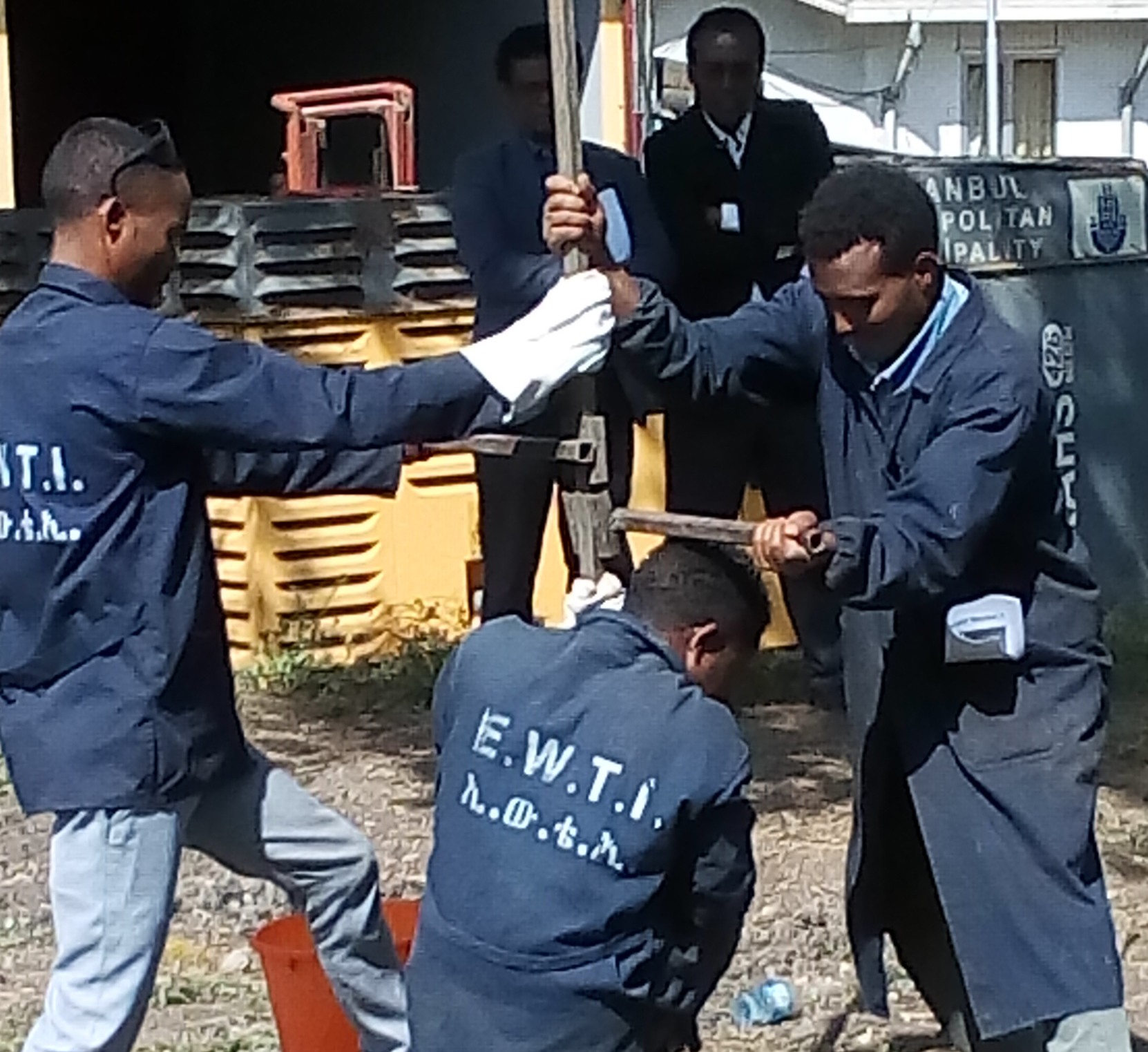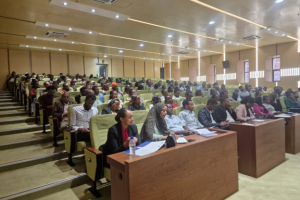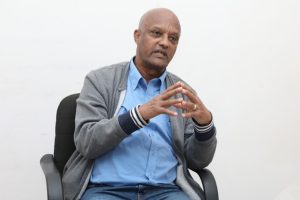
Turning on the tap for drinking, bathing, cooking, and flushing the toilet are the activities that some of us take for granted, but there are millions of people around the world who struggle daily to obtain clean water for a drink or boiling water for tea, as well as fulfilling their sanitation needs. The government of Ethiopia is committed to improving access to safe water and sanitation across the country. It collaboratively works with various non-governmental organizations to improve the daily lives of the poorest communities who are in need of the low-cost water, sanitation and hygiene services.
Collaborating with international partners like the Japan International Cooperation Agency (JICA), the Ethiopian Water Technology Institute (EWTI) ensures the selection of technologies that are appropriate to the needs of the people. For institutional development, the Institute is obtaining technical and training support, from JICA and the Smart Centre Group of the Netherland, to operate and maintain the technology. In this regard, The Ethiopian Herald recently approached experts of these pertinent stakeholders of EWTI to discuss how they encourage innovation and why they are seeking improvements in water and sanitation technology.
Akino Kitazume, Chief Adviser for the JICA project in EWTi, recalls that JICA has been supporting this institute for long time since the very beginning in 1998. Although it has contributed to the establishment of the foundation of this institute to be a sustainable training center, the JICA project had withdrawn after 15 years of assistance.
Again 6 years ago in 2013, EWTI became a national institute transformed from the project based organization. With an intention to make EWTI an independent, and sustainable national training center for water sector, then JICA have come again and started supporting this institute since 2017. Now, the JICA project is supporting EWTI to strengthen the operations and management of the trainings provided to trainers of trainees, Akino explained.
“Since EWTI has already the foundation which is more important to give the training, the management staff must also be strengthened and capable enough to operate and manage the whole training programs.” She also says: “We give the various types of trainings to the EWTI staff both the technical as well as the management aspect.
So far, we have done most of the technical training to EWTI trainers in the field of ground water development, drilling technology, drilling machinery maintenance, and electro mechanical maintenance.” In addition, Akino says that JICA have given a series of training in instructional design which is aimed at improving the teaching method of the trainers.
The trainers have to be equipped with not only the practical skill, but also the instructional capacity. So, they would able to teach others very well. As to Akino, trainings have been given for the management staff of this institute to improve their theoretical and operational management skills based on the guideline which guides how to operate the whole training activities here in the institute effectively and efficiently.
Asked whether JICA has so far achieved or not in the water sector, Akino responds that some gradual changes have been seen in terms of practical skills and the teaching methods, for instance, trainers begin to develop their own text books including the assessment tools – (TTLM) Training Teaching Learning Materials. “We believe the effectiveness of the training should increase a little bit. In fact, little by little, they try to improve their skills by themselves. In due course, it is a long way to go; still a lot of trainers are in short of the practical skills, and they need to have more practical experiences,” Akino stresses. According to Akino, EWTI has lots of institutional problems in terms of financing for establishing its own income generating activities.
For example, if EWTI able to be more independent from the finance aspect, it may contribute more to the motivation of the trainers as well as the management staff. If it is able to utilize the resources they gain by it-self, this institution will able to maintain the machinery equipment and facility by its own budget.
It will also greatly contribute to retain the good quality training as an institute, she explains. In doing so, the institute will not able to obtain modern machineries, in which many of them are brought from outside the country by spending huge foreign currency, Akino states. “As you see a lot of machines here it needs spare parts that they need regular maintenance. But this institute is not capable enough to obtain those things locally.
These may be considered as obstacles for the regular maintenance of machinery and facility.” As to her, the problem is not only the finance, but also the government regulation that doesn’t allow the institute to obtain technological tools from abroad with foreign currency. Akino finally hopes for EWTI to be more independent, and no longer depending on the foreign assistance like JICA.
Since the staff members already existed here are motivated towards the improvement of their institute, they need exert more and more efforts by themselves to improve the capacity to provide quality trainings here. Likewise, Henk Holtslag, Senior Advisor to the Smart Centre Group of the Netherland, for his part says he is engaged in providing training in local water and sanitation technologies that are produced from local materials available in Ethiopia.
“If you produce it locally, you can repair it locally. We are now working on manually drilling technologies such as rope pump and solar pump in five countries in east Africa such as Ethiopia, Tanzania, Zambia, Mozambique, and Malawi. We are also starting now in Kenya. In these countries, we have applied several drilling technologies machineries both by manually and machineassisted drilling technologies,” Henk explains.
If the water is not deep, which is less than 30 meters, you can reach to water level best through manually drilling. But, if there is rock, it is difficult to reach to the water level; so we use machine drilling technologies, he added. On the other hand, if there is like clay, sand, and gravel, you may also use manually drilling technology, he says adding that, there are different manually drilling technologies in Ethiopia; but, we work on making the technologies very simpler to be produced locally.
Despite there is a foreign currency shortage in this country to import drilling machines, so it is crucial to look for the local market available in Ethiopia so as to make the tools with local materials, Henk states. Henk highlights that EWTI works with the government and other NGOs like AMREF, Water Aid, and TVETs to train local trainers and local entrepreneurs. The logic is that students who grasp knowledge about these technologies would able to offer trainings for other local entrepreneurs around them. As to Henk, trainers need to devote most of their time to get the knowledge how to operate the machines and technologies. Because these technologies looks simple but it has many details. In fact, “Learning about technologies is not a day long exercise; we have learned these technologies in hard way for 30 years.” According to Henk, Ethiopia is the first country in Africa which has a self-supply policy to scale up access to water for both rural and urban areas.
Director General of the Ethiopian Water Technology Institute (EWTI), Tamene Hailu states that his institute has already started the road towards becoming center of excellence in building water technologies’ capacity and technology transfer in East Africa by 2025. With an intention to fill the gaps observed in TVET Colleges across 7 states in Ethiopia, EWTI and other pertinent stakeholders have been providing various trainings for trainers of trainees, the Director General said.
On the other hand, the institute has been constructing a specialized water laboratory to address the problem related to water pollution and contamination issues. It has now 15 professional training fields focusing on water and relevant activities, the Director General explained. Alemayehu Gudeta, TVET Support Program and Competency Service Director, for his part said that after providing short-term training for trainers, the EWTI effectively launches the competency assessment service today that will improve the sector’s overall implementation capacity.
The evaluation is essential to cross check whether the trainers are capacitated or not. It is also important to motivate the existing and the newly joining manpower of the sector, he added. Institute’s Corporate Communication Director Wasihun Alemayehu disclosed that during the last 3 years of operation, the institute has received over 2700 trainers from various states of Ethiopia.
The Ethiopian Herald April 6/2019
BY ZELALEM GIRMA




